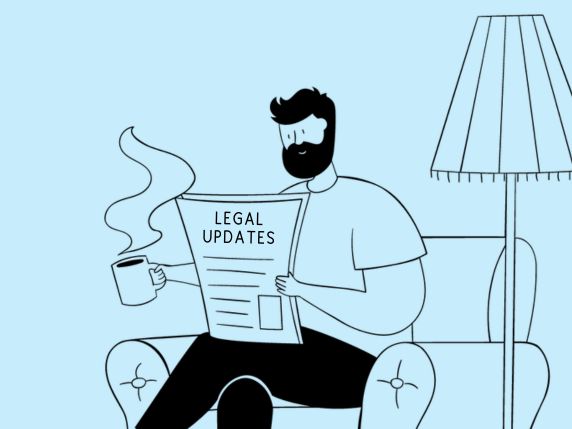In this month's update, we'll cover:
Coronavirus update
Government announces temporary 5% VAT for hospitality sector
On 8 July 2020, the government announced extra support for businesses severely affected by forced closures and social distancing measures relating to COVID 19. From 15 July 2020 to 12 January 2021 there will be a temporary 5% rate of VAT for certain supplies relating to hospitality, hotel and holiday accommodation, and for certain attractions such as amusement parks and theatres.
CMA launches investigation into hand sanitiser prices
The Competition and Markets Authority (CMA) launched four investigations into pricing of hand sanitiser on 18 June 2020. The CMA decided on 13 July 2020 to close three of its four investigations, finding that the retailers’ prices do not, or are unlikely to, infringe competition law. The fourth investigation is ongoing. The CMA’s decision to close these cases does not prevent it from re-opening an investigation if there were new evidence relating to the assessment.
Review of summer 2020 update
The Chancellor of the Exchequer’s mini-budget on 8 July 2020 confirmed the start of the second phase of the government’s response to the economic effects of COVID-19, with a targeted Plan for Jobs. The following measures, in addition to the employment support are to be introduced:
- The Green Homes Grant scheme will allow homeowners and landlords in England to apply for vouchers to pay for green improvements such as loft, wall, and floor insulation. The government will provide at least £2 for every £1 homeowners and landlords spend to make their homes more energy efficient, up to £5,000 per household. For those on the lowest incomes, the scheme will fully fund energy efficiency measures of up to £10,000 per household.
- A £1 billion Public Sector Decarbonisation Scheme will make public buildings, including schools and hospitals, greener, assisting the UK to meet its environmental objectives and help tradespeople involved in the construction industry.
- £5.8 billion will be spent on construction projects including hospital maintenance and upgrades, local road and school upgrades and local projects to boost those areas that need the investment most. A further £142 million will be spent on court maintenance to repair around 100 courts across England.
- The government has introduced a temporary cut to SDLT, setting the Nil Rate Band of Residential SDLT, in England and Northern Ireland at £500,000 until 31 March 2021. Over that level tax due will be reduced.
- The government is making £10 million of funding available immediately under the Automotive Transformation Fund, for the first wave of innovative R&D projects to scale up manufacturing of the latest technology in batteries, motors, electronics, and fuel cells.
- The government has launched five temporary schemes to help to support businesses across the UK who may need to respond to cashflow pressures as a result of the impact of COVID-19 by seeking additional finance. This includes the COVID-19 Corporate Financing Facility, the Coronavirus Business Interruption Loan Scheme, the Coronavirus Large Business Interruption Loan Scheme, the Bounce Back Loan Scheme, the Future Fund and HMRC Time to Pay. Specific support has been provided where last resort intervention has been required for businesses strategically important to the UK and to different sectors individually, such as the Cultural Recovery Fund for the arts. If you require assistance in knowing which support you can claim, please contact our solicitors.
The third phase of the government’s plan will be set out in the autumn with measures to support the longer-term recovery through a Budget and a Spending Review. These will detail further plans to invest in public services, to support innovation and growth-enhancing infrastructure with a National Infrastructure Strategy, to seize global opportunities and to level up opportunity across every region and nation of the UK.
Employment
Chancellor of the Exchequer’s plan for recovery in the employment market
During his Summer Economic Update in Parliament, the Chancellor announced ‘A Plan for Jobs’, which is the second phase of his plan to assist the jobs market through the COVID-19 pandemic.
A Job Retention Bonus, which will be a one-off bonus of £1,000 paid to the employer for each furloughed employee who earns at least £520 per month on average between the end of the Coronavirus Job Retention Scheme and the end of January 2021, and is still employed by 31 January 2021. This payment is to encourage employers to retain furloughed employees and support them back to work after the closure of the CJRS scheme in October and will be made from February 2021.
A new £2 billion Kickstart Scheme will also be launched to create jobs for 16-24-year-olds claiming Universal Credit and at risk of long-term unemployment. The Scheme will cover 100% of the National Minimum Wage for 25 hours a week for each six-month job placement and employers can top this wage up if they wish. There will be no cap on the number of places available under this scheme.
£1.6 billion will be invested in increasing employment support schemes, training and apprenticeships including: £2,000 for each new apprentice under the age of 25 and £1,500 for each apprentice over 25 (on top of the existing £1,000 payment provided for new 16-18-year-old apprentices and under 25’s with an Education, Health and Care Plan); a £111 million investment in traineeships in 2020-21 should assist with access to high quality training; £17 million of funding will be put into sector-based work academy placements in 2020-21; nearly £900 million will be invested to double the number of work coaches to 27,000; and over a quarter of a million more young people should benefit from the National Careers Service.
A huge drive towards decarbonisation and a new green infrastructure aims to improve job prospects in construction and supply of related materials through the Construction Talent Retention Scheme to support the redeployment of workers at risk of redundancy retaining construction skills and matching talented workers to opportunities. There will be a £3 billion green investment package that could help support around 140,000 green jobs and upgrade buildings and reduce emissions.
The government will create a new Office for Talent, which will focus on attracting, retaining, and developing top research and science talent across the UK and internationally.
The Government’s new Eat Out to Help Out discount scheme will provide a 50% reduction for sit-down meals in cafes, restaurants and pubs across the UK from Monday to Wednesday every week throughout August 2020, which it is hoped will increase demand in this sector. Combined with reduction in VAT in this sector, as mentioned above, it is intended that this will keep workers employed.
HMRC provides guidance on non-taxable provision of PPE
HMRC has made clear that if the risk of coronavirus transmission is very high for your employees when at work and your risk assessment shows PPE is required, you must provide properly fitting PPE for free, and this is non-taxable. If you are unable to provide PPE and it is required in the workplace, and the employee purchases this for themselves, you must reimburse them for the cost. This is non-taxable and employees cannot claim tax relief on these expenses from HMRC.
HMRC has also clarified this month that employers can make claims under the CJRS not just in respect of statutory notice periods, but also in respect of the contractual notice periods of furloughed employees. For more information on the CJRS, see this article.
Commercial
Fake online reviews investigated by CMA
The CMA announced at the end of last month that with the upsurge in online shopping, particularly due to the coronavirus pandemic, they will examine how websites detect, investigate, and respond to fake and misleading reviews. It will look at issues including:
- Suspicious reviews, such as where a single user has reviewed an unlikely range of products or services;
- Whether businesses are manipulating the presentation of reviews about their products and services, this might include combining positive reviews for different product; and
- How those paid in some way for reviews about products or services are handled.
Major websites will be reviewed to see if they are doing enough to crack down on fake reviews. If the CMA finds that any of these websites are not doing what is legally required, they will take enforcement action through the courts if needed and name and shame the businesses at this point, if appropriate to do so.
Corporate
Companies House announces end of its temporary voluntary strike-off policy
In March 2020, due to the impact of COVID-19, Companies House introduced temporary easement measures to suspend voluntary strike off action. Following a review of this policy earlier this month, the measure will be lifted from 10 September 2020. From that date, the process to dissolve companies that have applied for voluntary dissolution can start. Therefore, any applications for voluntary dissolution made from 10 July 2020 onwards will be registered and a notice published in the Gazette. If there are no objections to the dissolution, your company will be struck off in around 2 months’ time in the usual way.
If you have applied to strike off your company between March and 9 July 2020, from 10 September when the process is able to start, if there are no objections to dissolution and the 2 month period from the publication of the Gazette notice has expired, your company will be struck off shortly afterwards.
If you have already registered an objection to a voluntary striking off, but the time period for that objection is due to expire – you will need to register your objection again and you will receive confirmation as to whether the objection has been accepted or rejected. Objections should be sent to Companies House as early as possible after publication of the Gazette notice and at least 2 weeks before the notice expiry date.
The compulsory strike off process is still paused, this policy will be reviewed by Companies House, each month.
ICSA provides guidance on general meetings under the Corporate Insolvency and Governance Act
On 26 June, the Corporate Insolvency and Governance Act 2020 received Royal Assent making significant changes to insolvency and corporate governance law, reflecting the needs of business during the COVID-19 pandemic. ICSA published guidance earlier this month to assist companies holding shareholder meetings under this Act, including:
- How companies can hold shareholder meetings. The Act does not require participants to be in the same location, the meeting can be partially or fully virtual even if this is not permitted by a company's articles of association.
- Limiting attendance at shareholder meetings. Until 30 September 2020 (or, if later, until the end of any extension of the period during which the Act grants this flexibility) companies have the right to limit attendance.
- Voting rights and how these can be exercised. Companies are likely to provide facilities for members to appoint the chair of the meeting as their proxy. Some companies may also choose to allow shareholders to vote via an online facility or app, but this is not required by the Act.
- If a company has already issued its notice of meeting but wishes to amend the meeting location or date. The Act does not explicitly allow these details to be changed, so specific legal advice is needed in these circumstances.
- If companies are deciding whether to delay holding an AGM or laying annual reports and accounts before a general meeting in accordance with the Act. The Act does not extend the expiry date of corporate authorities and so again, specific advice is recommended.
- General meeting provisions of the Act and charities. The temporary measures in the Act flexibly override any contrary provisions in a company's articles of association.
The Companies (Shareholders' Rights to Voting Confirmations) Regulations 2020
The above Regulation was published on 9 July 2020 and inserts the following into the Companies Act 2006:
- A traded company must provide a confirmation of receipt of votes cast on a poll electronically; and
- A shareholder has a right to request information from the company to enable them to determine that their vote has been validly recorded and counted.
The Regulations apply to ‘traded companies’ as defined in section 360C of the Act and come into force on 3 September 2020.
Data Protection
ICO provides guidance for businesses collecting customer and visitor details for contact tracing
The ICO has provided advice for organisations and small businesses that are asked by government to collect and retain customer and visitor information, for a limited time period, for the purposes of a COVID-19 contact tracing scheme. Those who have limited experience of collecting and retaining personal data for business purposes may find it useful to refer to this article for more detailed advice and FAQs. If you have any further specific questions relating to your business, please contact our specialist data protection solicitors.
Government launches Call for Views on proposed regulation of consumer smart devices
The government has made proposals for regulating consumer smart product cyber security in order to protect citizens and the wider economy from harm that can arise from a vulnerable internet-connected product.
The idea behind these proposals is that no product within scope should be supplied or made available to consumers on the UK market, if it does not comply with three security requirements. This would establish a cybersecurity baseline for smart products that would be applied UK-wide.
The three recommended security requirements are to: ban universal default passwords, implement a way to manage reports of vulnerabilities, and to provide transparency on for how long, at a minimum, the product will receive security updates.
Any responses relating to the proposals should be received before midnight on 6 September2020.
European Commission launches public consultation on revision of NIS Directive
This stakeholder consultation has two objectives: to collect views on the implementation of the NIS (security of network and information systems) Directive in order to support the analysis on the retrospective evaluation of the Directive, and to collect views on the impacts of possible future changes to the legal act in order to support the forward-looking assessment.
There will be general questions in order to collect feedback from the public and more technical questions designed for expert stakeholders to provide their responses.
Intellectual Property
WIPO updates on services available under Madrid trademark system
In March 2020 Information Notice No. 12/2020 the International Bureau of the World Intellectual Property Organization (WIPO) informed that, until further notice, it would deliver certified documents and extracts by electronic means only and suspend legalisation of documents, for example. WIPO will send, by postal mail, print certified copies of certificates of international registration and renewal, attestations and detailed certified extracts requested between March 31 and July 12, 2020.
From 13 July 2020 WIPO will resume legalisation of documents and expedited services and will deliver certified copies of certificates of international registration and renewal, attestations and detailed certified extracts by electronic means only, as PDF files. WIPO will send, by postal mail, print copies of the above-mentioned documents upon express request only.
Brexit
European Commission publishes Communication on readiness for end of transition period
On 9 July 2020 the EC published a communication on readiness for the end of the transition period, setting out what changes would be happening in any scenario, deal or no deal (relating to trade in goods, trade in services, energy, travelling and tourism, mobility and social security co-ordination, company and civil law, data, digital and intellectual property rights and international agreements of the European Union).
The communication sets out a sector-by-sector overview of these main areas that will see changes and sets out measures that national authorities and businesses should take in order to be ready for these changes. It is advisable to ensure that well before the end of the year you look at this article in detail and ensure that your business is prepared. If you would like our assistance with this, please contact us. We will continue to keep you informed of any progress in the negotiations.
*Please note that this update does not constitute formal legal advice and should not be relied upon as such. Always ask a solicitor if you are unsure of how the law relates to your business.






